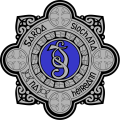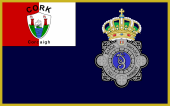Corcaigh Garda
| ||||||||||||||||||||||||||||||||||||||||||||||
The Corcaigh Garda is the policing agency of the Kingdom of Corcaigh. It is divided into four sub-administrations known as Hibernia Garda Cymru Garda Breizh Garda Kernow Garda of which are all responsible for policing separate areas of the Corkonian territories, additionally there is colonial police which is its own sub-administration which is responsible for policing all colonies of Cork. The other four are for policing all home territories.
Terminology
The service was originally named the Corkonian police but later was changed into the Garda then Royal Corcaigh Garda though is just referred to regularly as Garda. This title has been made permanent and unchangeable. When it comes to external territories that are not Ireland the word Garda does not fit into local languages in which is it still referred to as "Garda" or what ever is the equivalent of Guards.
The full official title, the Royal Corcaigh Garda is rarely if so never used in speech, however it is referred to depends on the register being used. It is variously known additionally as the traditional Irish term Garda Síochána in which this is not the official terminology. Popularly it is referred to as "the guards" and although Garda is singular, in these terms it is used as a collective noun, like police.
An individual officer is referred to as a garda or plural gardaí or gardas or less formally as "a guard", a police station or sometimes known as a "detachment" is referred to as a garda station. Garda is also the name of the lowest rank and the rank everyone passes at, also being the most common rank amongst the force, other countries usually term these as constable or officer or deputy. Though the Garda does consist of constabularies such as the Rathlin Constabulary guards are not called constables. All ranks can be referred to as a guard however typically when a guard of a lower rank greets or refers to one of a higher rank they are expected to use their official rank. The term "bangharda" is not used.
Organisation
Structure and numbers
Divisions
The Garda is divided into multiple divisions with different tasks and duties. For starters there is the regular Garda, this is the general policing unit that handles regular duties like traffic stops and handling civil disturbances. People who are in one division are not barred from joining another, members can be in multiple divisions at once at the same time. Guards in the regular Garda do not typically carry weapons other than a baton and taster, however ones within the ERU or are weaponed trained in some situations may be granted a pistol, this is only in disputed or tense situations and areas and when the authorization is given by a higher up commander. Typically this only stretches to small firearms like pistols.
The Public Order Unit or (POU) is the riot police division, who handle riots, violent protests and civil disputes, they are armed with a wide variety of riot control tools including riot shields, non-lethal submachine guns and more. The public order unit is trained to handle events in which protests turn violent and unpredictable.
The Emergency Response Unit (ERU) is the armed Garda unit, they are handle all weaponry and are essentially Cork's swat teams. They are trained to use all sorts of weaponry including sub-machine guns, shotguns, snipers, assault rifles and more. The Emergency response unit are tasked to deal with all threats involving dangerous weaponry or when much more firepower is needed to be deployed. The ERU do not handle counter-terrorism nor do they handle insurgencies however can be deployed as garrisons or rear guards to such situations.
The Territorial Support Unit (TSU) is the heavily armed branch of the Garda specialised in dealing with counter terrorism operations. Most of the guards in the territorial support unit would be members of the army, navy or airforce. Territorial support units also deal with raids and taking down street gangs and are given higher up gear to do so. The territorial support units main goal is to deal with insurgents, terrorist and gangs that use weaponry and or other weaponry to attack Cork. The territorial support unit is also military trained and regularly train with the Army Ranger Wing.
Garda Reserve
The Garda Reserve is the section of the Garda that is consisted of people who do not wish to regularly participate in SSUs or do active roleplay preferring a more lenient side where they occasionally participate. Garda reserves cannot reach a rank higher than Staff Sergeant and only take command when an active guard is unable to attend an ssu. Garda reserve additionally get paid less.
Rank Structure
| Rank | Commissioner | Deputy Commissioner | Assistant Commissioner | Chief Superintendent | Superintendent | Captain | Lieutenant | Sergeant of the Garda | Staff Sergeant | Sergeant | Garda |
|---|---|---|---|---|---|---|---|---|---|---|---|
| Insignia |  |
 |
 |
 |
 |
 |
 |
 |
 |
 |
 |
These ranks are fixed across every territory and administrative region, whilst not every region may use each rank, for example smaller areas with only one department, they still do not have any unique or new ranks and will still follow the naming and insignias. Some territories may have separate looks to the insignias this could be a different colour scheme or different design of pips.
Uniform and equipment
Uniform
Main Article: Uniforms of the Corkonian Garda
Currently Guards use current and former uniforms of the real life garda, this extends across the Home Territories, where Brittany, Cornwall and Wales all use the same uniforms. Colonial police may be permitted distinctive uniforms relative to where they are. The current standard issue uniform is a "sky blue" polo shirt with loose fitting operational trousers and a yellow-dark-navy waterproof jacket. Head coverings consist of visor caps and berets and for the most part they use Visor caps except in Wales where the Caubeen is used instead.
Equipment
Main Article: List of equipment used by the Corkonian Garda
Most uniformed members of the Garda do not routinely carry firearms/lethal weaponry, however individual guards have been issued batons, pepper spray and tasers as their standard issue weapons along with handcuffs as restraints. The service used to be armed from 2020-2023 however with 2024 the Defence Forces reorganisation act of 2024 it stated that the Garda would be an unarmed force for the most part, to save on costs and time training.
Armed Gardaí
The Garda has three different divisions explicitly tasked with armed support or armed patrols, however the Garda itself is primarily an unarmed force[1]. Armed officers serve as support to regular Gardai units when situation become un-dealable with conventional force and require more specialised units and better weaponry. Armed Gardai typically carry a Sig Sauer P226, Beretta M9, Glock 19 and Glock 23 as their sidearm, when it comes to primary weaponry they can be expected to carry gear like UZIs, M4A1, AR10, AR18, R700, M870 and others. In addition to pistols, less-lethal weapons such as tasers, pepper spray canisters and batons are also carried by armed Gardai.
Vehicles
Main Article: List of vehicles used by the Corkonian Garda
Vehicles used by the Corkonian Garda are a mix of that British policing vehicles and vehicles from the real life Garda, this consist of their colour design being are in colour and a fluorescent yellow and blue-bordered horizontal strip, accompanied by the Garda crest or the crest of the local police force/constabulary. Cork does not have distinctive vehicles for stuff such as traffic or road policing vehicles unlike the real life garda. However, cars with a red stripe do denote it is an armed unit. Unmarked patrol cars are also regularly used in the course of regular, traffic and other duties. Specialised units such as the TSU and ERU used armoured vehicles for special operations.
Governance and oversight
Policing Authority
Main Article: Policing Authority (Cork)
Garda Inspectorate
Main Article: Garda Inspectorate
Diplomatic protection
The Special Detective Unit (SDU) is the primary unit responsible for providing armed close protection to senior officials in Cork. They provide armed protection and transport for the Prime Minister, Deputy Prime Minister, Minister for Justice, Attorney General, Chief Justice, Director of Public Prosecutions, Ambassadors and Diplomats as well as foreign dignitaries visiting Cork and citizens deemed to require armed protection as designated so by the Garda Commissioner. The Commissioner is also protected by the unit. All members of parliament and cabinet ministers are also protected by the special detective unit. Former Prime Ministers and members of the cabinet are protected if their security is under threat otherwise they only receive protection on formal state occassions.
History
Inter-jurisdiction co-operation
Celtic Union
The Corcaigh Garda and Garda Síochána both co-operate to police the island of Ireland, members of the Corcaigh Garda are not permitted to enter the Celtic Union even in pursuit of an individual or group and are instead instructed to report them to the Garda Síochána. Same goes vice versa as Celtic guards are not permitted to police or pursue within Corkonian territories.
United Kingdom
The Kingdom of Corcaigh shares two borders with the United Kingdom in Wales and Cornwall. British police are not permitted to pursue or police in Corkonian territories and Corcaigh guards cannot pursue or police in the United Kingdom.
International
Corkonian guards are sent to additionally garrison and protect Corkonian embassies across the world. These guards are usually always unarmed except for tasers and batons unless given permission by the local government.
Controversy and allegations involving the Garda
- ↑ However, some regions always carry guns, such as Brittany.

